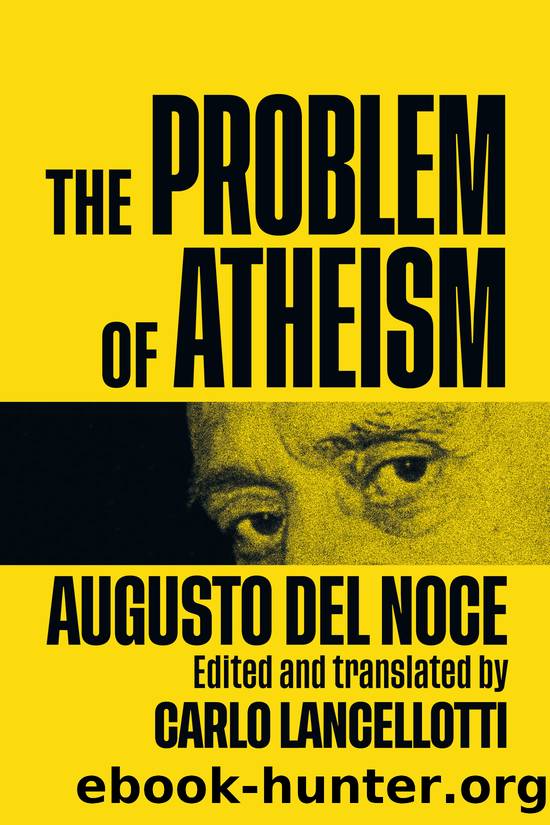The Problem of Atheism by Augusto Del Noce;Carlo Lancellotti;

Author:Augusto Del Noce;Carlo Lancellotti; [Lancellotti;, Augusto Del Noce;Carlo]
Language: eng
Format: epub
ISBN: 9780228009382
Publisher: McGillQueensUP
Published: 2021-12-02T06:00:00+00:00
3. CHRISTIANITY AND MARXISM
Yet, this critique leaves us with an undeniable feeling of dissatisfaction. Not only because of the psychological and moral difficulties that the leftist Christian experience may reveal, with respect to which a logical critique is fruitless, but also in the much more important sense that this experience may point to a very important truth that, however, it has not adequately expressed. In fact, this thought seems to be suggested by the widespread sentiment that the actual relationship between Christianity and Marxism is more complex than the usual ways of articulating it â either as pure antithesis, or Marxism as a partial social truth distorted by a false philosophy or, finally, Marxism as the gravedigger of sinful modern civilization (a view that reproduces, after all, a scheme that Catholics commonly apply to every new trend of thought: Romanticism, Idealism, etc.). Therefore, now I would like to consider not how this experience may present itself and develop according to my view but, rather, how it must do so by its internal necessity, once the contradiction of Christian-Marxism has been recognized.
Let us start from the historical contradiction that, in Balboâs judgment, makes necessary the qualitative leap: âas long as denying the unverified working hypothesis means for him to simultaneously deny God, man has essential motives to refuse to give up the âfetish.â These are motives that man cannot suppress without suppressing himself as a real man, given that the foundation of religion is real and meta-Âhistorical, because it is manâs very being ⦠wars of religion are also historical signs of menâs consciousness-of and will-to being.â325 Or equivalently: Marxism-Leninism in its orthodox form demands, besides a historical political judgment, a truth judgment, without being able to give, in regard to Christianity, the element that would support it. Let us now discuss what can be the meaning of this objection.
First of all, what has already been said makes clear that Marxism cannot conduct its criticism of Christianity based on the evidence of its principles. It can only base it on the fact that Christianity is âhistorically exhausted.â But clearly this argument, taken in the usual empirical sense â namely, the appearance that Christianity is exhausted because in todayâs world it fails to be for those who profess themselves Christian the principle of their life in history â is not rigorous. Because what we are talking about in this case is the recognition of the exhaustion of a determined historical ideal (e.g., the theocratic ideal, or the type of dualistic Christianity), which is arbitrarily fixed to be the absolute practical ideal of Christianity, without taking into account that the transcendence and supra-historicity of Christian principles forbids that any absolute historical ideal be derived from them. Faithfulness to supra-historical principles can only be creative faithfulness, which creates ever new solutions to the ever new problems that historical experience presents. The fact that in certain periods this creative faithfulness may be lacking, that the âChristian worldâ may experience declines and crises, is completely irrelevant, rigorously speaking, with respect to the truth or not of Christianity.
Download
This site does not store any files on its server. We only index and link to content provided by other sites. Please contact the content providers to delete copyright contents if any and email us, we'll remove relevant links or contents immediately.
From Bacteria to Bach and Back by Daniel C. Dennett(2485)
The God delusion by Richard Dawkins(2309)
Boy Erased by Garrard Conley(1731)
THE SELFISH GENE by Richard Dawkins(1625)
The Falls by Unknown(1527)
God Is Not Great by Christopher Hitchens(1335)
Christopher Hitchens by The Portable Atheist: Essential Readings for the Nonbeliever(1321)
the god delusion by richard dawkins(1319)
Outgrowing God by Dawkins Richard(1319)
THE GOD DELUSION by Richard Dawkins(1312)
Drunk with Blood: God's Killings in the Bible by Steve Wells(1285)
Triumvirate of Rationalism: Thomas Paine, Thomas Jefferson, and George Orwell by Christopher Hitchens(1283)
The Rage Against God by Peter Hitchens(1266)
About the Holy Bible by Robert G. Ingersoll(1261)
The Atheist Muslim by Ali A. Rizvi(1232)
Atheism: A Very Short Introduction by Julian Baggini(1219)
Why I Am Not a Christian and Other Essays by Bertrand Russell(1183)
Battling the Gods by Tim Whitmarsh(1153)
Emancipation of a Black Atheist by D. K. Evans(1152)
